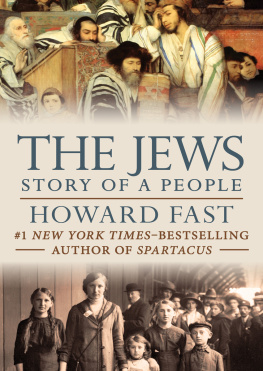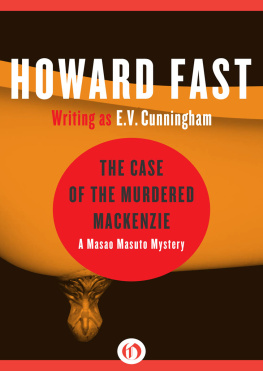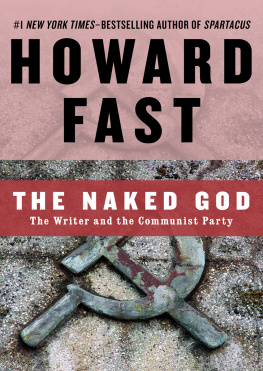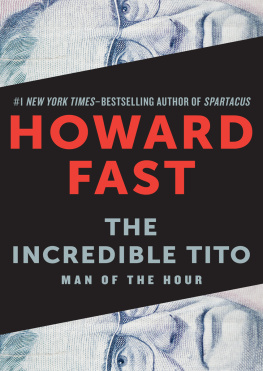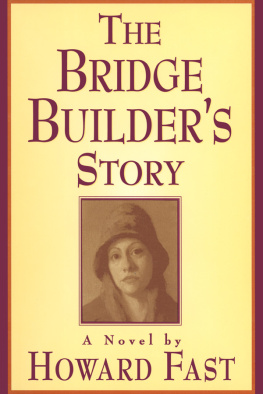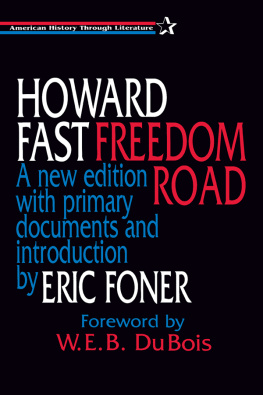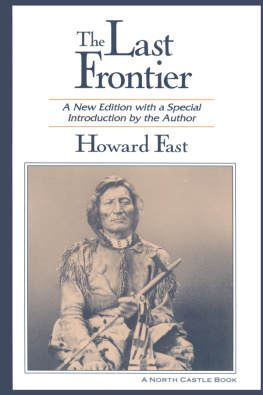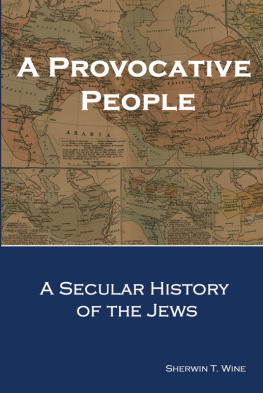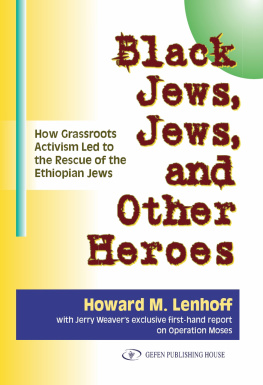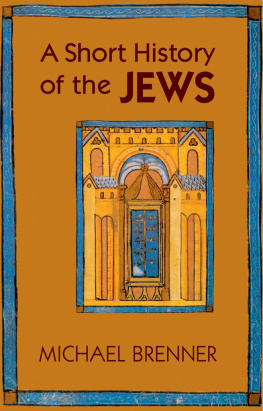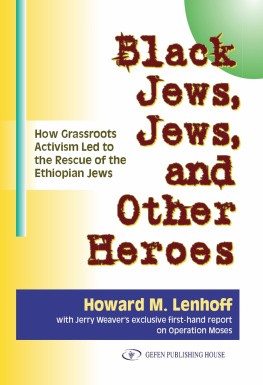

The Jews
Story of a People
Howard Fast

To the memory of
IDA FAST
BARNEY FAST
ISAAC COHEN
CONTENTS
INTRODUCTION
Many years ago, coming back from the Far East at the end of World War IIa journey by ship that took five weeksI read a biography of Christopher Columbus. The captain of our ship was an old Dane, and after I finished the book, he and I had several long discussions about Columbus. The captain held that Columbus knew exactly where he was going and how long it would take him to get there. When I asked him how this could possibly be, he offered an interesting speculation. Firstly, he told me that in ancient times Jews had maintained a school of cartography on the island of Majorca and that this school furnished shoreline charts to seamen entering the Mediterranean. Secondly, he informed me that the Viking traders had always maintained an interesting relationship with the Jews, and that when the Vikings entered the Mediterraneanto raid as well as to tradethey required shoreline charts. Thirdly, he drew the conclusion that in exchange for their charts, the Vikings had given the Jewish cartographers charts of their explorations to North America, and that subsequently Columbus had access to these charts.
All of this was highly speculative, but completely fascinating. This old Danish sea captain had his own view of history. It was the voyagers view. He saw history as a ceaseless flow and mingling of nations over the waterways of the world, and in response to the vitality of his imagination, I had my first glimmerings of a history of the Jews to be told somewhat in that fashion.
The seed he had planted took a long time to mature, and it was not until twenty years later that I decided to undertake the writing of this book. Most of the people I spoke to tried to dissuade me. They pointed out that I was not a scholar, that I was by training and vocation a writer of fiction, that a whole library of books on the Jews was already in existence, and the task was a terrifying one. I turned the arguments around. Here, I decided, was one of the most exciting and romantic adventures in all the history of mankind, a reality that no fiction could match. It had a continuity that spanned most of recorded history. It was filled with drama, passion, tragedy, and faith; and with all due reverence for the scholars, it pleaded for a storyteller to tell it as a story, indeed as the story of all stories.
Therein lies its strength as well as its weakness. The scholars will carp at this and that, and rightly so. But for the reader who ventures into Jewish history for the first time, I think I can promise a journey into an enthralling wonderland, all the more wonderful because it actually existed. There is no human being on the face of this earth exempt from the Jewish influence. For as long as there has been history, the Jew has wandered through it, shaping it at times, riding the current silently at other times, but always leaving his mark. History without the Jew? The world without the Jew? It is inconceivable.
An English cynic once wrote:
How odd
of God
to choose
the Jews.
Or perhaps not so odd at all.
PART ONE
THE DESERT
T HE DESERT WAS CRUEL and hard and dry, and these were the people of the desert. They were herdsmen; their wealth was in sheep and goats and they moved often, from one sparse pasture to another, from one water hole to another. Their community was tribal, and their chief was the patriarch of the tribe, the ruler absolute, the dispenser of justice and lord of life and death. He had many wivespossibly the right to sleep with any woman in the tribe who was unmarried and make her pregnant. His power was very great but it was limited by three harsh adversaries: poverty, hardship, and hunger.
The size of each tribe varied, perhaps from a minimum of a hundred to a maximum of a thousand. Hardly ever more than a thousand, for the water holes have not changed much in the three and a half thousand years since then, and we know that if a tribe increased to over a thousand, neither water nor pasture would support it.
The tribesmen lived in tents. They wove cloth from the wool of their beasts and worked leather from the skins. They worked copper into weapons, and when they were fortunate enough to trade their wool or cheese for some of the rare and precious tin, they made tools out of bronze. As yet they knew no iron, and their progress from place to place was on foot.
Their range of wandering and grazing was about three hundred miles in length from south to northeast in a ribbon fifty or sixty miles wide, from the southern part of the Sinai peninsula through the Negeb, and then in a sort of crescent through the area known as Jordan today. This is not to imply that all the tribes grazed over the entire area. Most likely, each tribe had grazing rights in a limited area. If the grass and water were good, then the particular tribe would cling to their place; but since the grass and water were like as not less than good, the tribe would look for a better place, and since another tribe had the better place, it meant war and bloodshed.
Life was hard, demanding, and bitter; but the air was clean and the night sky was filled with the presence of the universe, and herdsmen have time to contemplate and dream.
Three and a half thousand years ago, there must have been hundreds of these tribes in the vast desert that stretched from the Red Sea to the Syrian highlands. Since it would have been difficult if not impossible for a band of herdsmen to exist alone, the tribes were linked into loose confederations, binding themselves to a common if distant ancestor, and a common history-mythology, often a wonderful quilt of stories, transmitted verbally from generation to generation.
The confederated tribes would call themselves the children of the common ancestor, but this was merely a generic means of identification, which the desert herdsmen used for any and all nations. Our own interest is focused upon a singular group of tribes who called themselves the Children of Israel, or in their own tongue, the Beni-Yisrael.

Exactly how many of these Children of Israel tribeshow many minor clans and gens and subfamiliesthere were, we do not know. Records centuries later talk of the twelve tribes of Israel, but 12 was a magic number, a symbol-number, and even if we do a simple count out of the Bible, we come up with fourteenReuben, Simeon, Levi, Judah, Issachar, Zebulun, Dan, Gad, Naphtali, Asher, Joseph, Ephraim, Manasseh, and Benjamin. This was reduced to twelve by eliminating the Joseph designation entirely, and then taking the two so-called Joseph tribes, Ephraim and Manasseh, and counting them as half-tribes. Possibly there were a number of other Joseph tribes that history and the Bible forgot, and possibly the Amo-rites, another grouping of desert tribes, were so closely connected with the Beni-Yisrael, that there was a shifting back and forth.
Certainly, the Midianite tribal grouping, whose livestock grazed over the wild and sparse badlands of southern Sinai, were intimately connected with the Israelites, for out of their tribe of Ken came Moses bloodline if not Moses himself. And since the Kenites were unquestionably absorbed into the Israel grouping, we have fifteen tribes.
Next page
